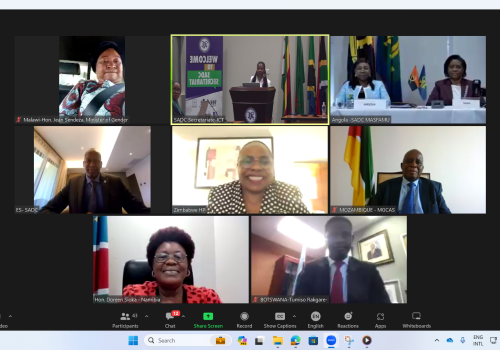|
Getting your Trinity Audio player ready...
|
The Southern African Development Community (SADC) Committee of Ministers Responsible for Gender and Women`s Affairs met virtually on 07 June 2024 to review progress in the implementation of the SADC Gender Programme. The Ministers encouraged Member States to prioritise the appointment of women in political positions and key decision-making positions.
The Ministers discussed and made decisions on the following issues: Gender mainstreaming in SADC; implementation of the Regional Multi-Dimensional Women’s Economic Empowerment Program (RMD-WEEP); Women, Peace and Security Agenda; Women in Politics and Decision-Making Positions; and commitment to the SADC Protocol on Gender and Development..
Honourable Anna Paula Sacramento Neto, Minister of Social Action, Family and Promotion of Women of the Republic of Angola, and Chairperson of the Meeting of Ministers Responsible for Gender and Women’s Affairs presided over the meeting.
In her opening remarks Honourable Neto stated that Ministers responsible for Gender and Women’s Affairs in the SADC region need to address issues of political will and commitment, by bridging the gap between policy intent and policy implementation and allocation of adequate resources towards gender equality and women’s empowerment, among others.
The Ministers` meeting was officially opened by Honourable Dalva Mauricia Calombo Ringote Allen, Minister of State for Social Affairs of the Republic of Angola.
In his statement, the SADC Executive Secretary, His Excellency Mr. Elias Magosi highlighted that some moderate progress has been observed with regards to women’s participation and representation in politics and other decision-making positions in the region, including in the public sector. However, progress in this area has, regrettably, been inconsistent across the region, particularly on women’s participation and representation in politics. He indicated that some of the Member States have recorded well below 15% of women’s representation in parliament, which is very difficult to label as an achievement, with some having regressed quite considerably from previous gains made.
The Executive Secretary further stated that, despite commitments made by SADC Member States through enactment of legislation to address gender-based violence, this violence remains high, with women and children continuing to be at the receiving end of this violence within domestic settings. There remains a worrying gap between policy and implementation, with most policy commitments made not being translated into action. He highlighted that as a region we cannot allow women and children to continue in the misery of this violence.
The Meeting concluded with the following key decisions for Member States:
- Prioritize the appointment of women in politics and decision-making positions and determine targets for the next five years to reach parity by 2030.
- Create an enabling environment for women’s participation in politics, including the implementation of special measures such as national quotas.
- Strengthen implementation of sustainable and effective GBV prevention initiatives that address negative attitudes and social norms and practices that perpetuate GBV.
- Allocate financial resources to build and strengthen the capacity of the different national development sectors on gender mainstreaming.
- Member States that have not developed the Women, Peace, and Security (WPS) national action plans to put in place these plans to support the implementation of the WPS agenda at the national level.
The Ministers’ meeting was preceded by a meeting of the Senior Officials responsible for Gender and Women`s Affairs from 05 to 06 June 2024 that discussed in length the implementation of the regional gender programme and proposed decisions that were subsequently approved by the Ministers.
SOURCE: SADC






